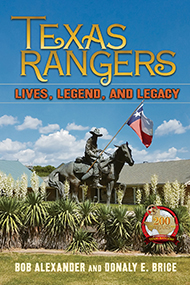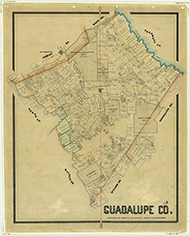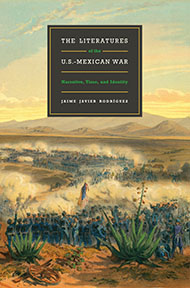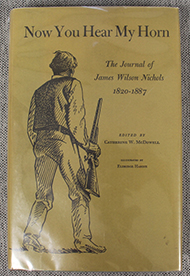Especially Texan: James Wilson Nichols
The writer of a detailed memoir that continues to interest readers today, James Wilson Nichols lived an adventurous life. A member of the Texas Rangers and a veteran of the Mexican War, Nichols left his mark on Texas history. Continue reading below to learn more about this interesting fighter, farmer, and writer.
James Nichols, a Texas Ranger and frontier memoirist was born on December 27, 1820, in Franklin County, Tennessee, the son of George Washington and Mary Ann (Walker) Nichols.
James Nichols kept a journal that was eventually published as a memoir, Now You Hear My Horn (1968). His account vividly described his life following the relocation to Texas. The Nichols and Johnson Day families traveled the Tennessee, the Mississippi, and the Red Rivers to Natchitoches, Louisiana, and from there they traveled overland to Guadalupe and Gonzales Counties. Nichols' journal stated the party crossed the Sabine River into Texas on December 16, 1836. The families took up residence near Gonzales on March 2, 1837.
In an affidavit from 1876, Nichols claimed that he served in Capt. James Cheshire's Company in defense of Nacogdoches during the San Jacinto Campaign of 1836. Some historians have suggested that Nichols was present at the battle of the Alamo; however, these dates disprove such speculations. An entry in Nichols's journal recalled the crowds waiting in San Antonio to see David Crockett's gun, but there is no previous mention of Crockett elsewhere in the diary.
Like his father and his grandfather, Nichols frequently moved, but he always settled back in Guadalupe and Gonzales Counties. Between 1838 and 1842, he enlisted with Captains Joseph D. Clements, Mathew Caldwell, and James Bird as a member of the Texas Rangers and Minute Men. In 1839 he scouted for Capt. James Callahan. Nichols wounded his hand on August 12, 1840, in combat against Comanche at the Battle of Plum Creek.
On March 5, 1842, during the occupation of San Antonio by the army of Mexican Gen. Adrian Woll, Nichols' company encountered a messenger from Gen. Rafael Vásquez on the outskirts of San Antonio, asking for the city to surrender. Against overwhelming force, Capt. John Coffee Hays and his 100 men called for an evacuation of the city. On September 17, 1842, Nichols served with Mathew Caldwell in the battle of Salado Creek, which forced Gen. Woll to retreat back into Mexico. Additional Minute Men heard the news and traveled to San Antonio, but Vásquez retreated to the Rio Grande. Nichols received land grants in Gonzales and Lampasas Counties as a result of his ranger service, and later filed for a pension.
Continue reading below...
|
|
TSHA Auction: Featured Book of the Week
Now You Hear My Horn: The Journal of James Wilson Nichols, 1820-1887
Auction Ends on 8/6, 5:00 p.m. CT
Read more about the life of Nichols in this first edition book. All proceeds from the sale of this book, as well as the others on our eBay page, will support the mission of the Texas State Historical Association.
|
|
Nichols married Mary Ann (Polly) Daniell on September 14, 1843, in Montgomery, Texas. The family expanded to ultimately include twelve children. He manufactured furniture for a local wood shop. With this occupation, he traveled to San Antonio to make trades and bargain with others for goods. For two years he was employed in the furniture business. During the Mexican War, Nichols enlisted as a corporal with Capt. Henry McCulloch and Lt. Col. Bell's Mounted Volunteers. Following his discharge on October 6, 1847, the Nichols family resided temporarily in Guadalupe, Hays, and Blanco Counties before settling in Kerrville.
In the late 1850s Nichols came into conflict with secessionists because of his Unionism. Men from a town committee voted on a resolution ordering him to leave the county within the next ten days but Nichols answered that when they came for him, they would be greeted by "two double-barrel guns. Now you hear my horn." (Hence the title of his memoirs.) He was convicted of trumped-up horse-stealing charges, but Governor Francis R. Lubbock granted him a pardon and the court reversed the case. In 1861 he moved to an adjoining county.
In the 1880s, Nichols worked as a farmer and completed a memoir of his experiences. In 1891, Texas Monthly published a portion of his memoir as "Adventures of an Old Ranger." James Wilson Nichols died in Kerrville on October 8, 1891, and was buried in Ingram at the Nichols Cemetery, where a flood carried away his headstone. In 1982, a historical marker was erected northwest of downtown Kerrville to honor Nichols Cemetery.
Content courtesy of the Handbook of Texas
Copyright © 2018 Legacy of Texas, All rights reserved.
Our mailing address is:
Legacy of Texas
3001 Lake Austin Blvd.
Suite 3.116
Austin, TX 78703
No longer want to receive these emails? Unsubscribe
.






